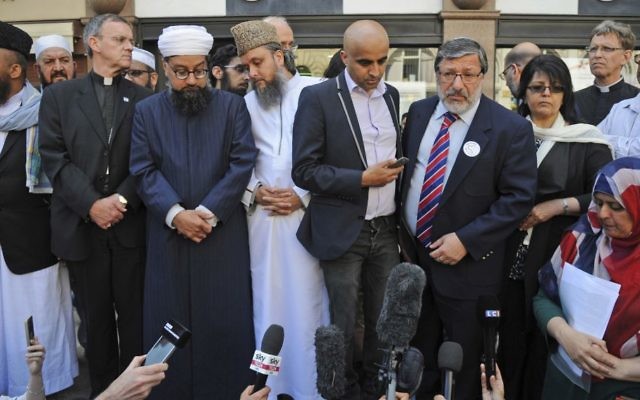
London-based Henry Jackson Society think tank report says integration may be key to tackling anti-Jewish prejudice in Muslim community.
Nearly half of British Muslims endorse some anti-Semitic conspiracy theories, a newly published report has found.
However, anti-Semitic sentiments drop sharply — by as much as 12 percentage points — among those Muslims who are more integrated into British society.
It also suggests that British Muslims who attend mosque most frequently have the warmest feelings towards Jews and the State of Israel.
The report, published by the London-based Henry Jackson Society think tank, finds that 44 percent of Muslims agree with the statement that British Jewish people tend to be more loyal to Israel than to the UK. Just 13% of Muslims disagree and believe British Jews are more loyal to the UK than to Israel.
A separate poll cited by the report suggests that 24% of the British public at large believe British Jews are more loyal to Israel than the UK.
The International Holocaust Remembrance Alliance definition of anti-Semitism states that “accusing Jewish citizens of being more loyal to Israel, or to the alleged priorities of Jews worldwide, than to the interests of their own nations” is a form of anti-Semitism.
The report is based on a poll of 750 British Muslims conducted by the Savanta-ComRes polling agency between November 25 and December 5, 2019. It draws comparisons with wider attitudes in the UK which were explored by an ICM Unlimited survey of 2,011 British adults carried out between December 6 and 9, 2019.

The poll also indicates that, contrary to some perceptions, younger people and those with a higher education are not less likely to hold anti-Semitic views. Forty-seven percent of Muslims with a college degree back the “dual loyalty” charge against British Jews, compared with 40% of those who did not attend university.
Forty percent of British Muslims between the ages of 18 and 24 believe Jews are more loyal to Israel than the UK. Seventeen percent of the general population within the same age range also hold the same view, ICM Unlimited found.
The Savanta-ComRes poll finds that 34% of British Muslims believe Jews have too much control over the global banking system. The ICM Unlimited poll reports that 18% of British adults share this view. Thirty-three percent of British Muslims also believe that Jews have a disproportionate influence in politics. That view fell to 15% of Britons at large, according to ICM Unlimited.
More British Muslims believe that Jews have too much control over the global media, arms industry and entertainment industry than do not share this view, the Savanta-ComRes poll finds.
“For too long, conspiracy theories about Jews have been shared with impunity around the UK’s Muslim communities by those who seek to spread division,” the report’s author, Dr. Rakib Ehsan, said in a press statement.

“Unfortunately, the evidence has shown this has had an effect — I’m sorry to say that too many within British Muslim communities have been willing to indulge in anti-Semitic conspiracies,” he said.
“When British Muslims such as myself have attempted to raise concerns over anti-Semitism within our communities, we have all too often been greeted with abuse by co-religionists,” added Ehsan, who is a research fellow at the think tank.
The Savanta-ComRes poll revealed that Jews register the weakest faith-group favorability score — at 5.49 out of 10 — among British Muslims. Christians placed second-highest with 6.23, followed by Sikhs (5.78), Buddhists (5.68), and Hindus (5.58). The lowest rating is received by atheists and non-believers at 5.10.
The report also finds that Israel received the lowest favorability rating among British Muslims of nine countries and territories which the poll tested — with Palestine ranking second behind the UK.
The highest mean favorability score is registered for the UK at 7.6, with Palestine placed at 6.56, followed by Saudi Arabia (6.25), Iran (5.64) and India (5.36). Israel trails at 4.53 behind the US (5.14), Russia (5.06) and China (5.05).
However, the report also suggests that integration could play a key role in tackling anti-Semitism in the Muslim community.
It divides those polled into two distinct categories, what it terms “bonding” and “bridging” friendship networks. The “bonding” friendship network category includes British Muslim respondents who reported that about half, most, or all of their close friends belong to the same faith group. The “bridging” friendship network group includes British Muslims who stated that only a few or none of their friends are co-religionists.

The poll thus finds that Muslims in the “bridging category” were less likely to believe that Jews have too much control of the global media (30.2% compared with 37.7%) and less likely to believe that Jews have too much control of the global banking system (30.2% compared with 38.4%).
Similarly, the survey indicates that British Muslims in integrated friendship groups are less likely to believe that Jews have too much control of the global arms industry (26.0% compared with 37.9%); less likely to believe that Jews have too much control over global political leadership (28.1% compared with 38.1%); and less likely to believe that Jews have too much control over the global entertainment industry (27% compared with 38.6%).
“The one consistent thread throughout the report is that regarding social integration. British Muslims who are part of predominantly non-Muslim friendship groups report more favorable views towards both Jews and Israel, and are less likely to be of the view that Jewish people have too much control over the global spheres of banking, media, politics, entertainment and arms production,” writes Ehsan.
“Conversely, those who are part of social networks that predominantly — or indeed exclusively — comprise fellow Muslims, hold comparatively unfavorable views of both Jews and Israel,” he adds.
The report paints a complex picture about the role of mosque attendance. It finds that British Muslims who report attending mosque at least three or four times a week have the highest favorability rating towards Israel (5.13) with warmth towards the Jewish state dropping as attendance declines. Israel’s favorability score among Muslims who say they only go to mosque once or twice a year, or who never attend, was 3.55.

A similar pattern emerges with regards to attitude towards Jews. British Muslim respondents who attend a mosque at least three or four times a week hold more favorable views of all faith groups polled, when compared to those who reported that they never attend, or only attend a mosque once or twice a year. The favorability score of Jews is 5.64 in the former group compared with 5.35 among the least frequent mosque-attenders.
At the same time, however, nearly 55% of British Muslim respondents who attend a mosque at least three or four times a week agree with the view that British Jews are more loyal to Israel than to the UK. The corresponding figure for respondents who never attend a mosque or do so only once or twice a year was more than 20 percentage points lower at 33.8%.
But, notes the report, “a comfortable majority of those who frequently attend a mosque, are also of the view that British Muslims are more loyal to Saudi Arabia than to the UK. Indeed, frequent attendees are far more likely to be of the view that various faith groups are more loyal to a foreign country of religious significance, than to the UK.”
The report suggests that these findings might reflect “a broader ‘Religion First’ perception” by which those who attend mosque more frequently believe that a number of faith groups, including their own, are “more loyal to other countries (and territories) of religious significance.”
(Times of Israel).